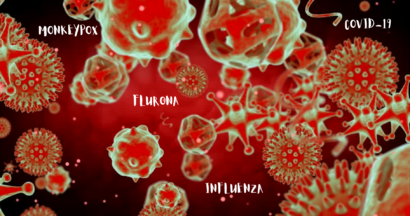Our senior health advisor and epidemiologist Chris Maher AO provides his latest overview of infectious disease activity both in Australia and in our international region. We’re here to ensure that your business or organization is kept informed, ready and safe.

COVID-19 is currently going through a lower incidence phase globally. High vaccination levels combined with very high levels of exposure to the virus have resulted in current high immunity levels. This is demonstrated in the southern hemisphere countries that are seeing seasonal increases in COVID cases and hospitalizations, but less ICU admissions and less deaths proportionately than earlier epidemic phases.
- Globally, reported new cases and deaths are at their lowest since the pandemic began, although testing and reporting rates have also declined considerably.
- XBB recombinant variants remain dominant as a proportion of viruses sequenced, with the most common being XBB1.5, XBB1.16, and XBB1.9.1. WHO considers that there is currently no evidence of an additional public health risk due to these variants, but both XBB1.5 and XBB1.16 are currently regarded as Variants of Interest.
- In both Australia and New Zealand, cases are steadily increasing as we progress through winter. The increase in cases is being reflected in an increase in COVID-associated hospitalizations and deaths, however, ICU admissions and deaths remain low compared to previous peaks.
Recommended Action
Ensure continued high levels of vaccination coverage, including boosters as they become due. Continue to encourage all employees to get tested if feeling symptomatic, report if they are positive and stay at home.

WHO reports rises in influenza activities across the southern hemisphere, with most activity due to Influenza A (H1N1). In Australia, laboratory-confirmed cases of influenza continue to increase and are higher than in any of the past 5 years except 2022. In the northern hemisphere, influenza incidence is very low in most reporting countries, as expected for the summer months.
Forms of avian influenza continue to be reported from several countries, including continued detection of sporadic human cases, most recently from China (H3N8) and Chile (H5N1). The avian influenza situation is one that we should continue to be concerned about as there is a potential for the virus to ‘jump’ from birds to mammals to humans.
Recommended Action
You and your employees should get your flu shots as we go into the winter season and maintain the good practice of staying at home if feeling sick.

There are reported increasing Measles cases in several countries, including South Africa, Nepal, Indonesia and Ethiopia. This is currently the main measles transmission season for northern hemisphere countries, and the seasonality is exacerbated by declines in immunization coverage of infants over the past three years.
Recommended Action
Travellers who have not been vaccinated should consider vaccination in advance of travel into areas that may have increasing cases or have low vaccination rates due to the pandemic (e.g. the Pacific).

No immediate threat locally in Australia. New outbreaks of polio due to type 2 circulating vaccine-derived virus (cVDPV2) have been reported in recent months from Burundi and Indonesia. The Burundi outbreak is clearly associated with transmission occurring in DRC, as are the recent detections in Zambia and Malawi. The recent Indonesian isolates are related to detections in northern Sumatra (Aceh) in late 2022.
Recommended Action
Travellers who have not been vaccinated or who are due for a booster should be vaccinated in advance of travel to countries and regions reporting polio, or with low vaccination coverage rates.

Countries with increasing cases and reported deaths: Cambodia, Malaysia, Philippines (highest increase), Fiji, Samoa and the Solomon Islands.
Australia: 21 cases reported between 6th – 19th March 2023. The number of cases was higher for the current year compared with 2020 -2021. This may be attributed to COVID-19-related travel restrictions in 2020-2021. Before COVID-19, Australia had seen notifications of overseas-acquired cases from travellers returning from dengue-endemic areas.
Recommended Action
There is no vaccine to prevent dengue fever. The best protection is to avoid getting bitten. If travelling to dengue-prone areas and regions, do the following:
- Wear clothes that cover as much of your body as possible.
- Stay in accommodation with screens or bed nets.
- Use mosquito repellents (containing DEET, Picaridin or IR3535) and coils.

The viral disease is caused by the Japanese encephalitis virus (JEV) and is spread by infected mosquitos (who have become infected through biting pigs and waterbirds). JEV is endemic in parts of Asia and the Torres Strait region of Australia, and most recently has been detected in humans, animals and mosquitoes in mainland Australia. The Department of Health has declared it a Communicable Disease Incident of National Significance, allowing for heightened and better coordination between relevant government departments (Department of Agriculture, Fisheries and Forestry and Department of Health).
Recommended Action
Recommended to get vaccinated against JEV if travelling to Asia and the Torres Strait Region of Australia, especially if planning to do the following activities:
- Travelling into rural areas and undertaking outdoor activities associated with increased risk of mosquito bites.
- Staying in accommodation without air conditioning, screens or bed nets.
- Spending a month or more in the region.
Free vaccination is available for priority groups through the states and territories.
Information and support
If your organisation requires support in managing infectious disease risk, please reach out for further information.















